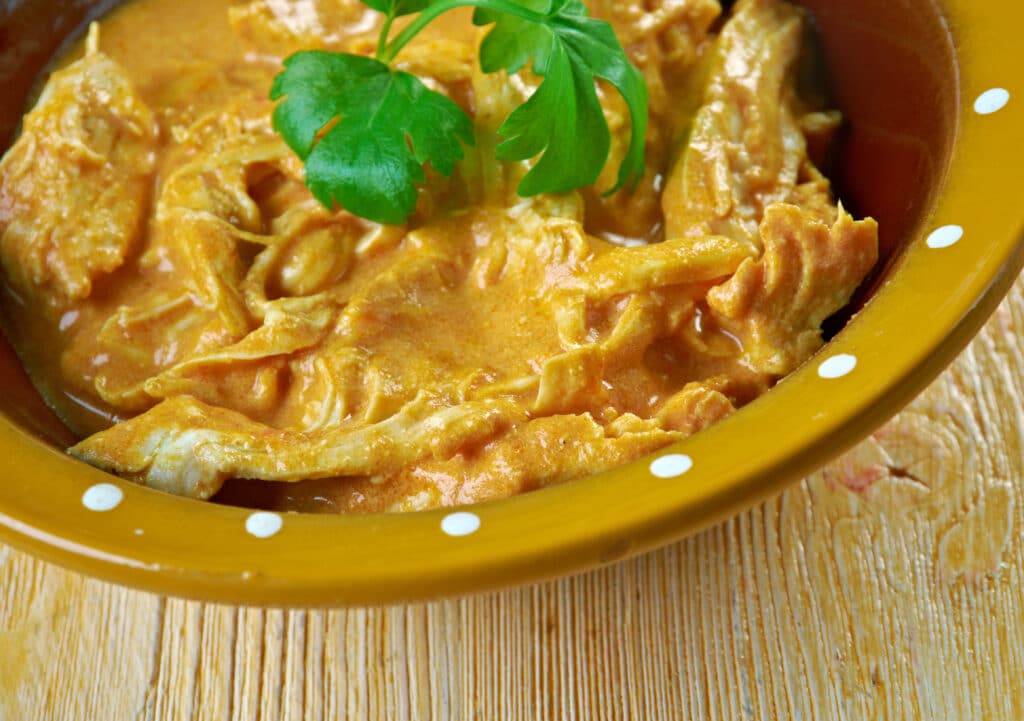
Welcome to our guide on Nyembwe chicken, Gabon’s national dish! Nyembwe chicken holds great cultural significance in Gabon, the West African nation that sits along the equator.
Our team at Remitly created this guide as part of our new series celebrating the traditional foods of our global customers.
The name “Nyembwe” comes from the Bantu language spoken in Gabon, and it refers to the palm nut oil that is used to cook the dish.
The dish is often served with plantains or cassava, which are staple foods in Gabon.
Recipe: Nyembwe Chicken
Ingredients:
- 1 whole chicken, cut into pieces
- 1 cup palm nut oil
- 2 onions, finely chopped
- 4 cloves of garlic, minced
- 2 tablespoons ginger, grated
- 2 tablespoons ground red pepper
- 1 tablespoon ground black pepper
- 1 tablespoon ground coriander
- 1 tablespoon ground paprika
- Salt to taste
- Fresh herbs for garnish (such as parsley or cilantro)
Instructions:
- In a large bowl, combine the chopped onions, minced garlic, grated ginger, ground red pepper, ground black pepper, ground coriander, ground paprika, and salt. Mix well to create a marinade.
- Add the chicken pieces to the marinade and coat them evenly. Cover the bowl and let the chicken marinate in the refrigerator for at least 2 hours, or overnight for best results.
- Heat the palm nut oil in a large skillet or pot over medium heat. Add the marinated chicken pieces to the hot oil and cook them until they are browned on all sides, about 5-7 minutes per side.
- Once the chicken is browned, reduce the heat to low and cover the skillet or pot. Allow the chicken to simmer in the palm nut oil for about 45 minutes to 1 hour, or until it is cooked through and tender.
- While the chicken is cooking, prepare your choice of side dish, such as plantains or cassava.
- Once the chicken is cooked, remove it from the skillet or pot and transfer it to a serving dish. Garnish with fresh herbs, such as parsley or cilantro.
- Serve the Nyembwe chicken hot with your choice of side.
Note: Palm nut oil can be found in specialty African or international grocery stores. If you cannot find palm nut oil, you can substitute it with another type of cooking oil, although it may alter the flavor of the dish.
Palm Nut Sauce: A Key Ingredient
Palm nut sauce is a key ingredient in Gabonese cuisine and is used to flavor many traditional dishes.
The sauce is made from the pulp of the palm nut fruit and is rich in nutrients and flavor. The sauce is often used to flavor stews and soups and is a staple in Gabonese cuisine.
Learn More About Gabonese Cuisine
Gabonese cuisine is a true reflection of the country’s rich cultural heritage and diverse culinary traditions. The cuisine of Gabon is characterized by the use of local ingredients, traditional cooking methods, and a wide variety of flavors. Here are a few key aspects of Gabonese cuisine that you should know:
- Staple Foods: Cassava and plantains are two staple foods in Gabon. Cassava, a root vegetable, is used in various forms such as fufu (a dough-like dish) and baton de manioc (cassava sticks). Plantains, which are similar to bananas, are often boiled, fried, or mashed and served as a side dish.
- Smoked and Grilled Meats: Smoking and grilling are popular cooking methods in Gabonese cuisine. Meats such as beef, chicken, and fish are often marinated in a mixture of spices and then smoked or grilled to perfection. These cooking methods add a unique smoky flavor to the dishes.
- Peanut Sauce: Peanuts are widely used in Gabonese cuisine and are often ground into a paste to make peanut sauce. This sauce is used to flavor stews, soups, and meat dishes. It adds a rich and nutty flavor to the dishes and is a favorite among locals.
- Fresh Seafood: Gabon’s location along the Atlantic coast provides access to a wide variety of fresh seafood. Fish, shrimp, crab, and lobster are commonly used in Gabonese dishes. Grilled or fried fish is a popular choice, and seafood stews are also common.
Visit the homepage, download our app, or check out our Help Center to get started.
